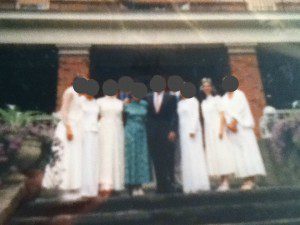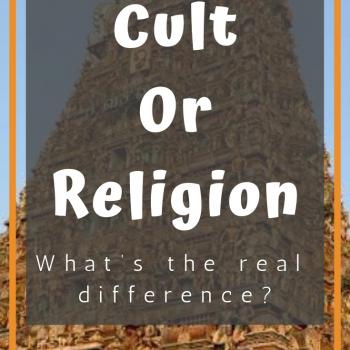There’s a show now created by Tina Fey (whose work I do like) called The Unbreakable Kimmy Schmidt. And it’s doing quite well, which really surprises me. I watched the first few episodes and found it so absurdly unrealistic that I couldn’t continue. The premise is that Kimmy Schmidt was one of three young women in a doomsday cult kept underground in a bunker but that her spirit and hope was never broken and once she is liberated she uses that Pollyanna optimism to succeed in life.
The people who created this show have clearly never experienced a cult in any form and have no idea what draws people into cults and what the experience of being in a cult is like.
Yes, it might be expecting too much for a silly comedy show to have a believable depiction of being an ex-cult member but I find Kimmy’s character so unrealistic that I can’t watch.

Sometimes I question whether it’s fair to call the organization I grew up in a cult. But there is one thing that convinces me it’s true. I obsessively read the stories of people who have left all sorts of cults and again and again I find familiarity in them. There are some common experiences that just about everyone leaving a cult feels, whether it’s Amish, Quiverfull, Scientology, etc. I read books about it and watch shows about it. I’ll always watch anything about a cult. Because it gives me a feeling of not being alone in my experience. Recently I watched Amish Shunned and I’ve been reading Leah Remini’s book about Scientology, Troublemaker. I also enjoy reading No Longer Quivering here on Patheos. All of them resonate with me and I recognize so much in the experiences of other people who struggle with leaving what No Longer Quivering calls spiritual abuse.

Wouldn’t call the Amish a cult? Here is my definition of a cult…
- Claims exclusive access to the keys to life/salvation/eternity
- People lower in the organization cannot question people higher up. People at the top have zero accountability
- Members become severely isolated from the rest of the world and are strongly discouraged from gaining any outside knowledge
- The organization controls and has rules for all aspects of your life. Members are not trusted to make their own decisions or choices
- Anything that feels wrong to your conscience is your problem and an indication you need more help within the organization
- There is a person on top (living or dead) who is equal to God and can do no wrong
Many religious groups meet at least most of this definition. And yes, I think a lot of religions can easily fall into the realm of cult. Not all cults are Jonestown (which even there seems to have started with good intentions and broke down because power tends to corrupt cult leaders).
And once, like me, you see behind the curtain of your religion and see that the rules you must adhere to don’t apply to people with more power than you, your heart breaks. Everything you were taught was a lie to keep you docile and in line. In Toublemaker Leah Remini’s young daughter tells her “You’ve left Scientology in your head but you have to leave in your heart.” And that part is so much harder.
People don’t join cults because they are stupid or gullible. Every kind of cult offers its followers something important. Usually deep and lasting happiness with a clear path on how to get there. Eternal salvation. A life with more meaning than your day-to-day grind. And I think the majority of cults start out with the best of intentions. Many do want to make a better world but eventually get bogged down by ego.

Cults don’t have to threaten you to get you to stay. Once you have the mentality of we are the special ones who have this important knowledge and you feel sorry for the people who aren’t in your organization then why would you ever give it up? How could you walk away from eternal salvation or the only tools that can bring lasting happiness? Why would you want to become the kind of person your family and friends look down on and feel sorry for (as you’ve seen done with people who have left)?
I find the idea that this woman, Kimmy Schmidt, could endure years of brainwashing and the cult leader as her only contact with reality and not be taken in by it insulting. I don’t think anyone comes out of a situation like that unscathed. The people creating the show act, as all people who have not experienced a cult do, like moving on is the easiest thing in the world. It was bad, so therefore getting away from it is good and it’s that simple. But for people like me whose whole concept of the world was built and created by the cult, leaving it is anything but simple.
It’s devastating. It tears apart everything you know. It may take years to recover or you may never recover. I feel as though the framework of my life crumbled and I don’t know which way is up anymore. I’ve been out for over ten years and it still effects me every day.
I have come to believe that people who have not experienced cults will never understand the way you can still want it and long for it even after you’ve left it behind. It will always have a mark on me. There is no cheerful and uncomplicated embracing of a new life. No learning to fully fit in with the “real world.” You can’t see it on me anymore. You can’t tell by looking or talking to me that I come from a cult background. But the mark of it is on my heart. Its legacy will always be part of me.
















